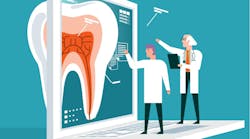Why the dental hygiene profession needs a doctoral degree option
In the academic and professional spheres, those with doctoral degrees are held in high regard. It’s indisputable that having a doctorate, whether professional or academic, leads to career advancement, salary compensations, research opportunities, and the opportunity to educate graduate-level hygienists.1
Dental hygienists equipped with doctoral degrees are key contributors to the upward growth of the profession’s knowledge base because of the unique and individualized research they conduct, as well as the grant writing skills they learn while in a doctoral program.2 Although dental hygienists who pursue doctoral degrees currently have to seek out that education in an alternate discipline, this can be beneficial because it allows them to bring a perspective outside of dentistry while still contributing to scientific literature.2
Unfortunately, without the option for a doctoral degree in dental hygiene, the profession has struggled to move forward because development of modern information that guides clinical practice is dependent on research often produced in doctoral programs.2,3 If dental hygienists are to be part of an interdisciplinary health-care team, and if research is a driving force behind the advancement of dental hygiene principles, then academic and professional doctoral programs in dental hygiene must be established.
Dental hygiene and the interdisciplinary health-care team
With the rates of periodontal disease in adults exceedingly high and tooth decay the number one chronic condition in US children and adults, it’s no wonder that dental hygienists need to be more involved at the local, state, and national levels to increase access to care.2,4 The current dental hygiene model trains hygienists in a two-year entry level program. This is necessary to gain practical clinical skills, but it’s in higher level education where they acquire leadership, education, critical thinking, and decision-making skills.5 Hygienists provide valuable care in clinical settings, but there are still large populations with social determinants that keep them from accessing the oral health care they need.4
By encouraging hygienists in their undergraduate degree programs to seek advanced degrees such as a doctorate, opportunities may present for them to participate in research, decision-making, or policy reform to address disparities that exist in oral health care.2 Dental hygienists who have a doctoral degree not only have their clinical foundation, but also possess leadership, administrative, and research skills that allow them to work as part of interdisciplinary health-care teams in educational institutions, health-care agencies, and hospital administration.1,5 This will help bring communities toward oral and systemic wellness through disease prevention programs and the promotion of healthy lifestyles.1,6
Research as a means to advancement
Research is the only way to learn new information and help the dental hygiene profession advance. The current entry level dental hygiene degree model does not allot enough time for students to complete original research pertinent to the growth and development of oral health-related topics.3,7 Research fundamentals are introduced in undergraduate curricula, but it isn’t until graduate and doctoral level education where original research is conducted.3
Most dental hygienists graduate from their undergraduate program and begin providing care in clinical practice settings. They need to understand that all the information provided to them in their undergraduate curricula stemmed from research principles. It’s research that guides the care they provide, and engaging in research will ultimately create a well-equipped, advanced hygienist who is educated in current scientific literature.3
Another critical component to providing research education at the graduate and doctoral level is having enough qualified educators to do so. Research has shown the significant impact educators have as mentors for undergraduate students to pursue higher level education.1 Without mentorship, students are often unaware of the potential academic and research opportunities that exist in dental hygiene if they pursue graduate and doctoral degrees. The current dental hygiene model sets up students for success in the clinical practice setting but doesn’t encourage them to seek academic and research growth through continuation of their education.1 By providing students with tangible information about seeking out a doctoral degree, advanced research specific to disciplines within dental hygiene has the potential to grow exponentially.
Everyone benefits
With the ultimate degree in dental hygiene currently a master’s degree, students who want to continue their education to the doctoral level in hygiene cannot do so at this time. If dental hygiene as a profession wants to be involved with health-care reform and take active strides toward increasing access to care nationwide, then establishing a doctoral program will provide students with the necessary skills to work alongside other health-care professionals.
Providing an academic opportunity for students to conduct individual research will help various sectors in health care understand what a critical component oral health has on people’s systemic health. With increasing numbers of dental hygiene students pursuing graduate level education, creating a doctoral program will help dental hygiene gain more credibility as a profession that brings a large knowledge base outside of the clinical practice setting.1,3
References
- Battrell A, Lynch A, Steinbach P, Bessner S, Snyder J, Majeski J. Advancing education in dental hygiene. J Evid-Based Dent Prac. 2014;14:209-221. doi.10.1016/j.jebdp.2014.02.005
- Carpenter E, Laza, AA, Essex G, Davis CA, Rowe DJ. Factors influencing dental hygienists' decisions to pursue doctoral degrees. J Dent Hyg. 2018;92(1):40-50.
- Gurenlian JAR, Spolarich AE. Advancing the profession through doctoral education. J Dent Hyg. 2013;87(1):29-32. https://jdh.adha.org.content/87/suppl_1/29
- Oral Conditions. Healthy People 2030. Accessed March 11, 2022. https://health.gov/healthypeople/objectives-and-data/browse-objectives/oral-conditions
- Ortega E, Walsh MM. (Doctoral dental hygiene education: insights from a review of nursing literature and program websites. J Dent Hyg. 2014;88(1):5-12.
- Palmer SK, Rogo EJ, Gurenlian JR. Exploration of the scholarship of doctoral prepared dental hygienists. J Dent Hyg. 2021;95(6):63-72.
- Tumath UG, Walsh M. Perceptions of dental hygiene master's degree learners about dental hygiene doctoral education. J Dent Hyg. 2015;89(4):210-218.
Annie Walters, MSDH, RDH, attended Northern Arizona University, where she spent time caring for individuals in Guatemala and Indian Health Service. She has a special interest in advancing access to care for individuals with specialized health-care needs. She’s a member of ADHA, and received her MS from the University of New Mexico, where she developed a chairside resource for RDHs to use for patients with specialized needs. She practices in Flagstaff, Arizona, and serves as part-time faculty at her alma mater. Contact her at [email protected].
About the Author

Annie Walters, MS, RDH
Annie Walters, MSDH, RDH, has extensive experience as an oral health-care provider. She has spent time caring for individuals in Guatemala and Indian Health Service sites and is passionate about advancing access to care for individuals with specialized health care needs. She is a published author and is trained in Orofacial Myofunctional Therapy. Annie received her graduate degree from the University of New Mexico and currently serves as an assistant clinical professor at Northern Arizona University. Reach her at [email protected].


